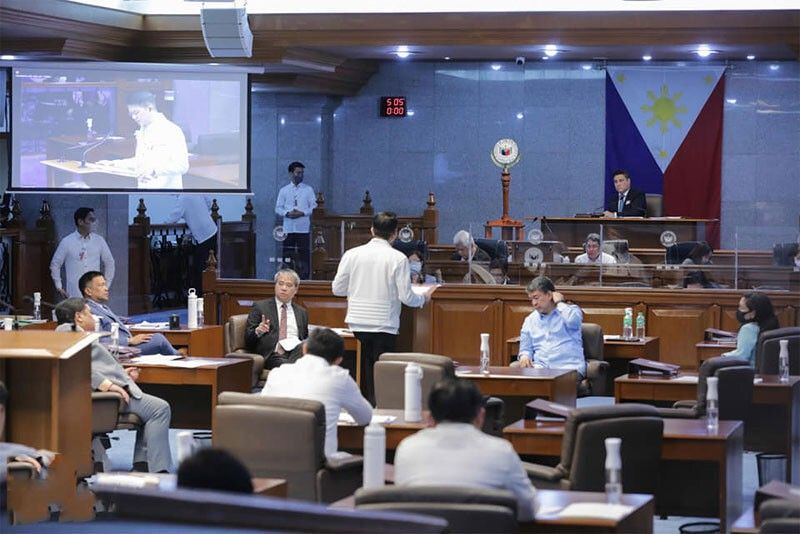Maharlika critics slam hasty bill approval

MANILA, Philippines — Critics of the Maharlika Investment Fund (MIF) slammed yesterday what they described as the bill’s hasty approval, raising concerns over conflicting provisions and potential legal and constitutional issues.
Senate Minority Leader Aquilino Pimentel III drew attention to Sections 50 and 51 of the enrolled bill, which prescribed different time limits for the prosecution of crimes or offenses.
Pimentel pointed out that Section 50 sets the prescription period at 10 years, while Section 51 extends it to 20 years. This discrepancy in the bill’s provisions is seen as a consequence of rushing the legislation, he said.
The senator warned that the MIF might enable “crony capitalism” and benefit specific individuals associated with the government.
Sen. Francis Escudero, who like Pimentel did not vote for its approval, also highlighted the error and suggested that it could only be rectified through a joint resolution once the session resumes.
But such a correction process would further delay the approval of the bill into law before President Marcos’ State of the Nation Address set next month.
If the bill is signed into law with the error, rectification would require amending the enrolled bill, which could be a cumbersome process. “This is what haste usually produces,” Escudero said.
In a separate radio interview Wednesday night, Escudero said his concerns about the possible unconstitutionality of the bill were not addressed during plenary debates.
He doubted the bill’s compliance with Article XII, Section 16 of the 1987 Constitution. This section specifies that Congress should only create government-owned or controlled corporations (GOCCs) through general laws, subject to the common good and economic viability tests.
Escudero argued that these aspects were not sufficiently debated and could be challenged in the Supreme Court if the bill becomes law.
With the House of Representatives adopting the Senate version of the bill creating the MIF during the bicameral conference committee, the need for ratification before transmittal to Malacañang has been eliminated.
However, critics raised additional constitutional questions, including the President’s certification of the bill as urgent despite the absence of a public emergency or calamity.
Supporters argued that the pandemic and global events necessitated urgent action.
For her part, Sen. Risa Hontiveros said she intends to support any petition filed against the MIF before the Supreme Court, emphasizing the need for economic viability and the doubts raised by experts.
Sen. Nancy Binay, who abstained from voting, expressed hopes that the fund would contribute to economic development. However, she also noted the lack of balance in the final bill and the significant risks associated with it.
‘Very different’ from House version
Yesterday, lawmakers from the Makabayan bloc expressed strong opposition to the Senate’s newly approved Bill 2020, establishing the MIF, citing significant deviations from the version passed by the House.
Kabataan party-list Rep. Raoul Manuel stressed the disparity, saying: “SB 2020 is very different from what we have discussed here and heavily debated in the House.”
He pointed out that while the House approved P75 billion for the MIF, the Senate’s version allocated P500 billion, equivalent to one-tenth of the annual national budget.
Moreover, Manuel expressed concern about the Senate’s provision allowing the government to borrow funds for MIF investments. “This means we will borrow so that there will be money for the investment fund. This means we will gamble through the issuance of bonds,” he explained.
Gabriela Women’s party-list Rep. Arlene Brosas criticized the very creation of the MIF, citing its potential risks. “It would be like gambling using the money saved by parents for their children’s education,” said Brosas.
She then recalled the country’s history of “cronyism and embezzlement during the Marcos dictatorship” and warned that if anything goes wrong with the investment fund, the country’s banking institution will be compromised.
“Worse, this Maharlika scam can be used as entry point for the full-scale privatization of GOCCs – currently collectively worth P10 trillion,” Brosas said.
Farmers, church groups oppose MIF
The Philippine Chamber of Agriculture and Food Inc. (PCAFI), a farmers’ group, lamented the inclusion of the Land Bank of the Philippines and Development Bank of the Philippines (DBP) as sources of funds for the MIF.
“We are worried as we already have limited access to the two banks,” said PCAFI president Danilo Fausto in a statement voicing out his group’s concern since lending to agriculture is a missionary endeavor of both banks.
Under the proposed MIF bill, Landbank will contribute a minimum of P50 billion to the MIF seed fund, while DBP will invest at least P25 billion, which PCAFI interprets as directing funds away from agriculture.
“There goes the money of Landbank and DBP which is supposed to go to us, so we are just afraid this is what will happen,” Fausto said.
Kilusang Magbubukid ng Pilipinas chairperson Danilo Ramos also opposed the allocation of Landbank funds to the MIF.
Not only did Ramos say it would deny farmers, fisherfolk and agriculture workers access to credit provided by Landbank, he also referred to the MIF as the “Marcos Investment Fund” and sounded the alarm it would not serve their sector’s interests or that of the Filipino people.
In an interview over Radio Veritas, Fr. Jerome Secillano expressed his disapproval of creating the MIF and suggested that whatever funds are to be allotted to it would better serve Filipinos by strengthening existing poverty alleviation programs of the government.
Secillano is the executive secretary of the Catholic Bishops’ Conference of the Philippines – Episcopal Commission on Public Affairs.
“There are already existing programs that aim to benefit Filipinos. Why not strengthen these instead of establishing another one that is already suspect from the very start,” said the priest.
Union leaders under the Confederation for Unity, Recognition and Advancement of Government Employees (COURAGE) urged Marcos to reconsider his push for the MIF, concerned that public money might go to waste.
COURAGE president Santiago Dasmariñas said good governance and development strategies using people’s money should be well-thought out and should have the people’s participation and support.
“The MIF is not all these and, hence, should be junked,” he said.
Meanwhile, as the proposed MIF awaits the President’s signature, bank industry experts pushed for good governance and setting high governance standards to prevent corruption and financial losses.
Diwa Guinigundo, former deputy governor of the Bangko Sentral ng Pilipinas (BSP), expressed surprise at the swift passage of the MIF bill when interviewed by “The Chiefs” on Cignal TV’s One News channel. — Bella Cariaso, Evelyn Macairan, Sheila Crisostomo, Lawrence Agcaoili, Emmanuel Tupas
- Latest
- Trending






























